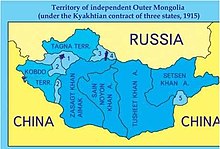This article needs additional citations for verification. (February 2011) |
The Dariganga (Mongolian: Дарьганга) are an eastern Mongol subgroup who mainly live in Dari Ovoo and Ganga Lake, Sukhbaatar Province.
 Location of Darigang (marked "5") | |
| Total population | |
|---|---|
| 27,412 | |
| Regions with significant populations | |
| Mongolia | 27,412[1] |
| Languages | |
| Khalkha dialect of Mongolian | |
| Religion | |
| Tibetan Buddhism, Shamanism, Atheism | |
| Related ethnic groups | |
| Mongols, Halh, Chahar, Ööled | |
| Dariganga Mongols | |||
|---|---|---|---|
| Chinese name | |||
| Simplified Chinese | 达里干嘎蒙古 | ||
| |||
| Mongolian name | |||
| Mongolian Cyrillic | Дарьганга | ||
| Mongolian script | ᠳᠠᠷᠢᠭᠠᠩᠭᠠ | ||
It is believed[by whom?] that the Dariganga were resettled by the Qing Dynasty from Chahar, Khalkha and Ööled to herd horses of the Emperor in the late 1690s.
From 1912 on, a Ministry of Internal Affairs of the Boghda Khaanate of Mongolia supervised them. And the People's Republic of Mongolia changed their banner system in 1921. After many reforms in Mongolian administration structure, the Dariganga people have lived in the sums: Dariganga, Naran, Ongon, Khalzan, Asgat and Bayandelger of Sukhbaatar Province since 1691.
References
edit- ^ National Census 2010 Archived September 15, 2011, at the Wayback Machine